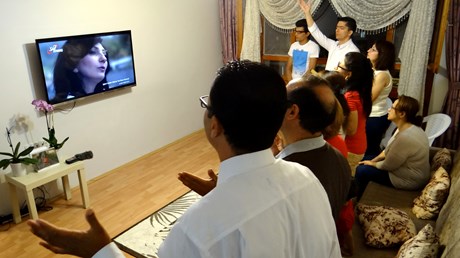Christian broadcaster SAT-7 tries to balance security and isolation in letting the Arab world binge watch programs of hope.

Growing up in civil war–era Lebanon, Rita El-Mounayer’s family often had to hook up the television to a car battery.
Last month, her ministry launched the first Christian on-demand streaming service in the Middle East.
“Television was our only refuge during the war, and was a communal activity,” said the international CEO of SAT-7. “This is what we will miss with [video on demand], but we have to be where the technology leads.”
SAT-7 is a pioneer in the field. Beaming Christian satellite TV programming into the Arab world since 1996, it now hosts channels specializing also in Turkish and Farsi.
In 2007, it launched a dedicated kids channel. Ten years later, a separate academy brand was created to provide schooling to Syrian refugees and later to assist with at-home COVID-19 education.
Each is now available at SAT-7 PLUS, through web and mobile apps accessible via Android or iOS. Approximately 20 percent of the broadcaster’s 25 years of content can be streamed, along with all current live programming.
“In Morocco, it used to be that viewers had to wait for days until the Christian teaching program was scheduled,” El-Mounayer said.
“Now, they can binge watch.”
While the advantages for the ministry are obvious, the drawback lies in contributing to a culture of isolation. But Arab youth today are comfortable alone, El-Mounayer said, and Christians must find ways to reach them.
The media giants certainly are.
The Middle East was relatively slow in adopting on-demand video. In 2014, a mere 1 percent of households subscribed to a streaming service. Showtime’s local affiliate launched the service in 2008, and Netflix established a regional presence in 2016. Amazon, Apple, ...
from Christianity Today Magazine
via




.gif)

.gif)
.gif)
